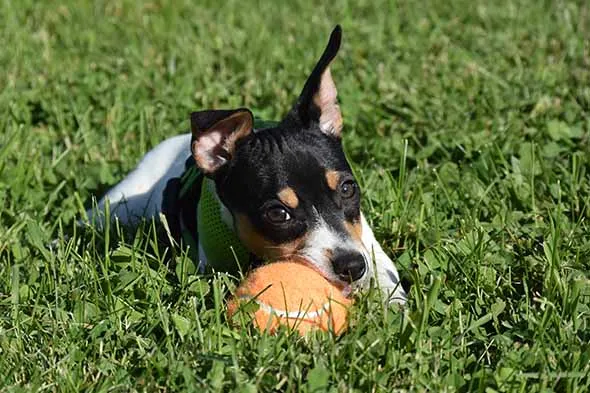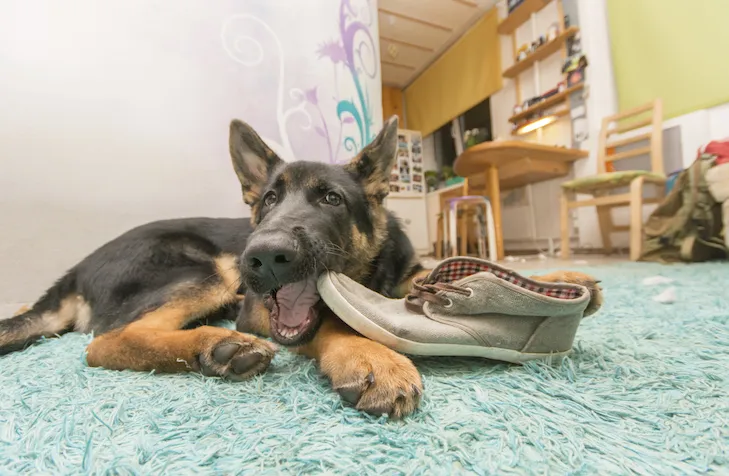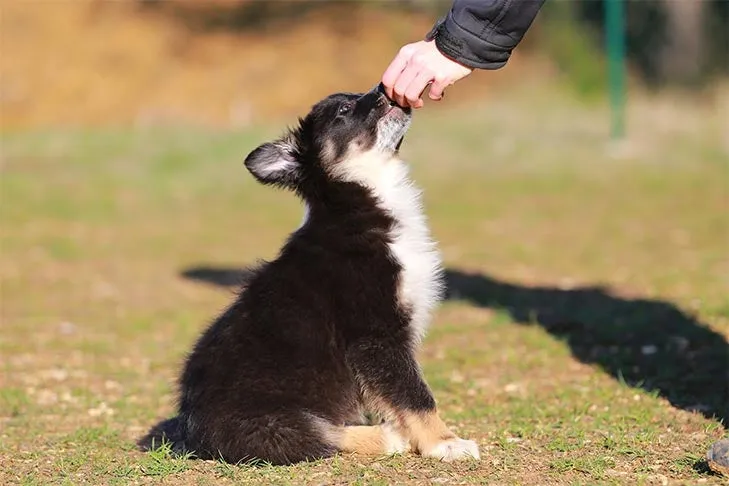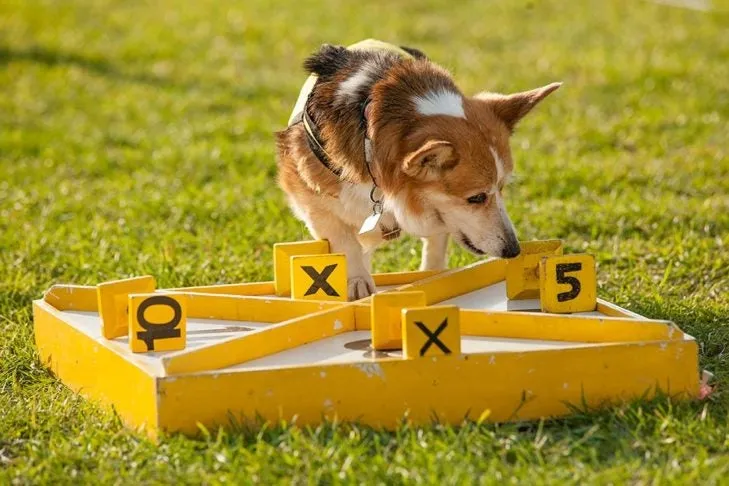Welcoming a new puppy into your home is an exciting time, filled with joy, discovery, and sometimes, a little bit of chaos – especially when it comes to their chewing habits. Chewing is a natural, essential behavior for puppies. It’s how they explore their new world, strengthen their jaws, and, crucially, find relief from the discomfort of teething as their adult teeth emerge. However, without proper guidance, this natural instinct can lead to damaged furniture, shoes, and potentially dangerous situations if they chew on inappropriate items. Our goal at Dog Care Story is to help you navigate this phase by teaching your puppy What Is Good For Puppies To Chew On, ensuring their safety, protecting your home, and fostering positive habits from the start.
Understanding and managing puppy chewing doesn’t have to be a battle. By providing the right tools, consistent training, and a bit of patience, you can redirect your pup’s natural urges towards safe and satisfying outlets. This comprehensive guide will walk you through the best strategies and choices to encourage appropriate chewing behavior, ensuring a happier and healthier environment for both you and your furry companion.
The Instinct to Chew: Why Puppies Need to Chew
Puppies explore their environment primarily through their mouths, making chewing an intrinsic part of their development. This isn’t just a playful act; it serves several vital purposes. From about three weeks to six months of age, puppies experience the discomfort of teething, similar to human babies. During this period, their baby teeth fall out, and their permanent adult teeth push through, causing sore gums. Chewing provides much-needed relief by massaging their gums and helping new teeth to emerge.
Beyond teething, chewing helps puppies develop strong jaws, clean their teeth, and fulfill a primal need for oral stimulation. It can also be a self-soothing behavior, helping them cope with anxiety, boredom, or excess energy. Recognizing these underlying reasons for chewing is the first step in effectively managing it and providing appropriate alternatives.
Provide a Variety of Safe & Appropriate Chew Toys
Since chewing is a necessity, it’s crucial to equip your puppy with an abundance of safe and appealing options designed specifically for their age and chewing intensity. Without designated chew toys, your puppy will instinctively find their own alternatives, which often include your most cherished possessions or hazardous household items. Look for chew toys that are durable, non-toxic, and appropriately sized for your puppy’s mouth to prevent choking hazards.
Consider a range of textures and materials to keep your puppy engaged. Soft rubber toys are great for gentle chewers and younger pups, while tougher nylon or hard rubber options can satisfy more aggressive chewers. Always supervise new toys to ensure they are safe and don’t break into small pieces that could be ingested. For those wondering what is a good chew bone for puppies or seeking long-lasting dog chews, exploring various designs and materials will help you find the perfect fit for your pup’s unique chewing style.
 A cute Teddy Roosevelt Terrier puppy happily chewing on a red rubber ball in green grass, demonstrating appropriate puppy chewing behavior.
A cute Teddy Roosevelt Terrier puppy happily chewing on a red rubber ball in green grass, demonstrating appropriate puppy chewing behavior.
Soothe Teething Pain with Frozen Options
Teething can be a particularly uncomfortable experience for puppies, often leading to increased chewing intensity. Just like with human infants, applying cold can help alleviate the pain and inflammation in sore gums. Offering frozen chew options can provide immense relief and channel their chewing urges towards appropriate items.
Simple, cost-effective solutions include ice cubes (ensure they are appropriately sized to prevent choking) or frozen wet washcloths. You can also find commercial chew toys designed to be frozen, offering a cooling sensation as your puppy chews. Another excellent idea is to fill a food-stuffable puppy toy with a mixture of mushy kibble, dog-safe broth, or mashed banana, then freeze it. This creates a long-lasting, soothing treat that rewards your puppy for chewing appropriately.
Consult Your Veterinarian for Personalized Advice
Your puppy’s first veterinary visit is packed with important discussions, and chewing habits should definitely be on the agenda. Your vet is an invaluable resource for personalized advice on [what is good for puppies to chew on] based on your specific puppy’s breed, size, and anticipated chewing strength. Different breeds have varying jaw strengths and chewing tendencies, which will influence the type of chew toys and edible chews that are safe and effective.
Your vet can also offer guidance on the suitability of edible chews, such as specific dental chews or natural treats. For instance, while a softer chew toy might be perfect for a young pup without a full set of adult teeth, a more robust option like a bully stick might be better suited for a stronger chewer who has transitioned to permanent teeth. Discussing popular options like dried beef lung for dogs or specific dental health products can ensure you make the safest choices. This is especially true when considering the best dental chews for puppies under 6 months, as their delicate mouths require extra care.
Puppy-Proof Your Home: Secure Valuables and Dangerous Items
It’s unreasonable to expect your puppy to inherently know the difference between their designated chew toy and your favorite pair of slippers. To them, if something fits in their mouth and feels satisfying to chew, it’s fair game. In fact, items that smell strongly of you, like shoes or remote controls, can be even more alluring.
Before bringing your puppy home, take the time to thoroughly puppy-proof your living space. Keep all valuables, hazardous chemicals, medications, small objects, and, most importantly, electrical wires out of reach. Securing these items prevents both damage to your property and potential life-threatening accidents for your curious pup.
 A curious German Shepherd puppy chewing on an owner's sneaker on a wooden floor, highlighting the need to puppy-proof and prevent inappropriate chewing.
A curious German Shepherd puppy chewing on an owner's sneaker on a wooden floor, highlighting the need to puppy-proof and prevent inappropriate chewing.
Constant Supervision During Waking Hours
Even with a thoroughly puppy-proofed home, vigilant supervision is key during your puppy’s waking hours. Puppies are incredibly fast and can find new temptations in the blink of an eye. The leg of a coffee table, a loose thread on the carpet, or a baseboard can quickly become their next chewing project.
Keeping a watchful eye on your puppy allows you to intervene immediately when they eye an inappropriate item. This isn’t about punishment, but about swift redirection. As soon as you notice them focusing on something they shouldn’t chew, gently redirect their attention to an appropriate chew toy. This teaches them what is acceptable and what isn’t.
Crate Training & Safe Confinement for Unsupervised Times
It’s simply not feasible to supervise your puppy every second of every day. For those times when you need to step away – even just to shower or run a quick errand – a safe, confined space is essential. Crate training is an excellent way to provide your puppy with a secure den where they can relax without the opportunity for destructive chewing. Ensure the crate is appropriately sized and comfortable.
When your puppy is in their crate or a dog-secure pen, always provide them with several appropriate chew toys. This keeps them occupied and reinforces positive chewing habits. Food-stuffed chew toys are particularly effective here, as the reward of tasty treats makes chewing on the toy a highly desirable activity. This helps your puppy form a strong, positive association with their designated chew items and their safe space.
 A focused Border Collie puppy in a wire crate happily engaging with a food-stuffed chew toy, promoting positive reinforcement for appropriate chewing during confinement.
A focused Border Collie puppy in a wire crate happily engaging with a food-stuffed chew toy, promoting positive reinforcement for appropriate chewing during confinement.
Master Essential Commands: “Leave It”
One of the most valuable commands a puppy can learn is “Leave It.” This cue tells your puppy to disengage from an item they are interested in but shouldn’t have. It’s not just about preventing chewing on your slippers; “Leave It” can be a lifesaver, stopping your puppy from ingesting dropped medications, toxic foods, or other dangerous objects.
Start by teaching “Leave It” with low-value items and gradually increase the difficulty, practicing in various environments. The goal is for your puppy to understand that “Leave It” means to ignore the item, even if it’s highly tempting. Consistent practice builds a reliable response that can protect your puppy from harm.
Master Essential Commands: “Drop It”
While “Leave It” prevents your puppy from engaging with an inappropriate item, the “Drop It” or “Out” command teaches them to release something they already have in their mouth. This command is crucial for safety and for retrieving items your puppy might have snatched.
Teach “Drop It” by offering a higher-value treat or toy in exchange for the item in their mouth. This positive reinforcement makes dropping the item a rewarding experience. Avoid chasing your puppy to get an object, as this can inadvertently turn it into a fun game of “keep away” and make the situation worse. Patience and positive exchanges are key to establishing a reliable “Drop It” command. For those interested in popular dental treats, learning is it okay to give puppies Dentastix can be a useful step in managing their oral health and training.
Satisfy Needs with Ample Physical & Mental Stimulation
A bored puppy is a destructive puppy. When puppies lack sufficient physical exercise and mental stimulation, they will often find their own “entertainment,” which frequently manifests as inappropriate chewing. Providing a balanced routine of activity can significantly reduce problem behaviors.
Ensure your puppy receives appropriate levels of physical exercise for their breed and age, including walks, supervised playtime, and fetch sessions. Equally important is mental stimulation through training sessions, puzzle toys, and interactive games. Brain games and cognitive training can tire a puppy out just as effectively as physical activity, making them less likely to resort to chewing out of boredom or excess energy. This proactive approach helps channel their energy into positive outlets, leading to a calmer and more well-behaved companion.
 An intelligent Corgi puppy actively solving a puzzle toy, demonstrating mental stimulation and reducing boredom that can lead to destructive chewing.
An intelligent Corgi puppy actively solving a puzzle toy, demonstrating mental stimulation and reducing boredom that can lead to destructive chewing.
Avoid Punishment After the Fact: Focus on Redirection
Puppies live in the moment. If you discover a chewed-up item minutes or hours after the fact and then scold your puppy, they won’t connect your anger to the chewing incident. Instead, they will likely become fearful or confused, associating your unpredictable behavior with your presence rather than their past action.
Punishing your puppy “after the fact” is ineffective for teaching and can damage your bond. If you catch your puppy in the act of chewing something inappropriate, the best approach is immediate redirection. Gently interrupt the behavior, say “No” or “Ah-ah” in a firm but not scary voice, and immediately offer an appropriate chew toy. Praise them when they start chewing the correct item. This teaches them what is good for puppies to chew on in real-time and reinforces positive choices.
Conclusion
Teaching your puppy appropriate chewing habits is a cornerstone of responsible pet ownership, transforming a potentially destructive phase into an opportunity for growth and learning. By understanding their innate need to chew, providing a variety of safe and appealing chew toys, offering relief for teething pain, puppy-proofing your home, and consistently applying positive reinforcement through training and redirection, you lay the groundwork for a well-behaved and happy dog. Always remember to consult your veterinarian for tailored advice on chew toy choices and any concerns regarding your puppy’s dental health or chewing behavior. With patience, consistency, and the right tools, you can guide your puppy to make excellent chewing choices, ensuring a harmonious home for years to come. For more expert advice on puppy care and training, explore other articles on Dog Care Story!
